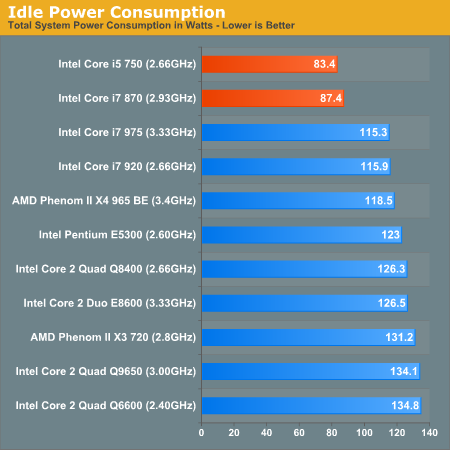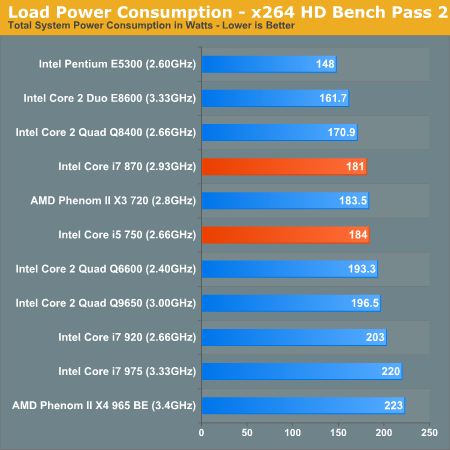Intel's Core i7 870 & i5 750, Lynnfield: Harder, Better, Faster Stronger
by Anand Lal Shimpi on September 8, 2009 12:00 AM EST- Posted in
- CPUs
Power Consumption
If you'll remember back to last year's Nehalem coverage I made a point to mention that the Nehalem architecture, thanks to its PCU and power gate transistors, was the most power efficient of the high end options. The lower the TDP, the more important power efficiency is and thus it's no surprise to see Lynnfield truly impress when it comes to power consumption:

At idle the Core i5 and Core i7 870 use less power than any other processor we've ever tested. Note that these idle power figures include an idling GeForce GTX 280. With a lower power graphics card, you could easily get to idle power consumption around 60W. Once we start seeing on-package GPUs, total system power consumption should drop even further.

Under load the Core i5 and Core i7 870 continue to impress. They both draw less power than a Q6600 or a Q9650, all the while outperforming the two. Power consumption is also noticeably lower than Bloomfield.
These things are fast and smart with power. Just wait until Nehalem goes below 65W...










343 Comments
View All Comments
HexiumVII - Tuesday, September 8, 2009 - link
I must say that Lynnfield is the best stock processor ever. It will o/c itself without you having to touch it at all. Nearly perfect for the masses. I absolutely can't wait for the notebook incarnation.ClagMaster - Tuesday, September 8, 2009 - link
The performance of these processors is what I thought they would be based on your May Preview Article. Its great the NDA is lifted and we can now see what this processor can really do.This is hardly a Celeron. I know a troll in earlier Lynnfield/P55 that should be eating crow.
Apahutec - Tuesday, September 8, 2009 - link
Not sure what "core parking" priorities are (reduce power consumption by grouping tasks on active CPUs, or tune performance by taking into account cache trashing in scheduler decisions), but it sounds like it could even be beneficial on my Core 2 Quad: single socket, no HT, but two Core2 Duo (each with its own L2 cache) glued together.erple2 - Tuesday, September 8, 2009 - link
Sounds like it, but the logic that controls that on the CPU is on the CPU, and uses up a couple million transistors. That would require a re-spin of the Core 2 parts (which, given the P55 platform release, I think is a safe bet won't happen), however.Obsy - Tuesday, September 8, 2009 - link
I don't get how Turbo Boost ends "dual-core or quad-core?" I know that an on-die IGP is a selling point for the upcoming 32nm dual cores, but wouldn't they be clocked higher than these quads and have Turbo Boost too? There will be dual cores clocked higher than quads again. Or is Intel not clocking their dual cores past the speeds of quads?macs - Tuesday, September 8, 2009 - link
Would be interesting an article about P55 mobo with nf200 chip and 2 gpu...Ryan Smith - Tuesday, September 8, 2009 - link
We talked to NVIDIA about that scenario a couple of weeks ago. A NF200 chip would not make a significant difference in performance, which is why they're letting manufacturers go ahead and just split lanes with a straight-up bridge chip.Darkanyons - Tuesday, September 8, 2009 - link
Thanks for this great article!!Tomzi - Tuesday, September 8, 2009 - link
Do the PCIe controller's voltage demands impose stricter limits on undervolting in the case of Lynnfield processors compared to Bloomfield? I can run my i7 920 at stock frequncies undervolted to 0.9xx V VCore. How much voltage (power consumption) reduction can we expect from the an i5 750?This might not be a hot topic so close to the release of the new chips when everyone is focused on top performance comparisons but I've always been interested in undervolting/clocking and would like to see a more complete picture.
Tomzi - Tuesday, September 8, 2009 - link
750 and 870 undervolted by ~0.1V reported on silentpcreview.